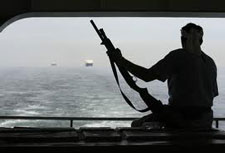Controlling Piracy
By Paul Gibbins 
It’s business as usual for the shipping industry following the recent EUNAVFOR raid on Somali soil. It’s timing can’t have been accidental, to coincide with the opening of the IMO session in London; ‘about time too’ was the general comment in the international and maritime trade media. Whilst this operation has been broadly welcomed, it does little to address the root of the problem and in the longer term more likely to have a counter productive effect.
But what has changed? In the short term, most certainly a heightened risk to those seafarers still held captive in the region and those NGO’s operating in Somalia, and also a clarion call from Somali fishermen to stop the attacks, concerned that they too might have their craft targeted. It is natural to assume that the pirates will go to greater lengths to avoid detection, blurring the distinction of pirate vessel and fishing boat. But will the attack actually dissuade pirates from plying their trade? Certainly, it will be harder, but the prizes are still there, albeit a minority of commercial ships, transiting without any security at all through the high-risk areas.
In some respects the majority of the shipping sector has reached a point of equilibrium in controlling piracy attacks, its implementation of Best Management Practice and the embarkation of Private Armed Security have stemmed the tide of successful attacks. Both of these have proven effective, particularly the armed option, and has bought the sector some time trying to do business through very difficult economic times. Despite all the associated risks of the armed option, it is working and providing a high quality service in an increasingly competitive and crowded market. Even here, there is growing stability in the quality of armed guards, where discussion within IMO this week of one singular ‘standard’ for these companies is gaining traction, with the Maritime Security Committee (MSC) looking at an ISO grading of maritime security companies.
But the Shipping Industry alone cannot be responsible for providing the solution to piracy; surely this is something that should be pursued by the international community. As has been seen, there is still a reluctance to get involved, and attacks from the sea may well continue, undoubtedly scoring highly in the short term, but making a difference ‘on the ground’? Unlikely. It must be confusing for Somalis, receiving messages of international aid, increasing financial donations and capacity building programmes such as the UN’s efforts in trying to build consensus through projects that communicate to Somalis that ‘piracy is not a good thing’: influencing the population whilst also preparing the next attack from the sea. But doesn’t the West realize that Somali’s are quite adept at conflict? They have had many years of it and are not easily persuaded to ‘do as they’re told’ by threat of violence. Destroying boats on the beach might quench the despair of the international community and a beleaguered shipping industry, but it will not stop disaffected Somalis from going to sea to hijack and ransom seafarers and vessels.
Understandably, the EU Naval Force and other international Navies operating in the Indian Ocean have been operating in an invidious position, prosecuting piracy and other maritime criminal activity from the sea, until recently, without being allowed to pursue these criminals onto the beach. In an increasingly militarized region, their presence has given new meaning to maritime security; but will NATO, the CTF 151 and the other independents, like Russia or China, follow EUNAVFOR’s example?
Piracy affects all states, be they coastal or inland. History has proven that piracy cannot be totally eradicated, but it is possible to control. Whilst nations cannot change geographical chokepoints channeling vessels into high-risk areas, they can exercise a greater rule of law reducing the pirates’ impunity to operate. Ship-owners have also taken up a more robust defence, but until a comprehensive approach is taken on land and offshore, piracy will continue. Destroying pirate vessels is punitive and equipment is easy to replace. Persuading an individual not to take up arms in the first place is far harder. So while states wrestle with how deal with a problem like Somalia, the commercial sector bears the brunt of controlling of piracy at sea.
Paul Gibbins is an independent communications consultant. He advises the private maritime security sector on strategic communications and has worked on various other communications projects in high-risk environments on behalf of the United Nations, the US & UK Governments in Sierra Leone, Lebanon, Iraq, Somalia, Afghanistan, Iraq and Kosovo. www.pgc-global.org Twitter: @pgcomms.
The views expressed are those of the contributor and do not necessarily reflect those of OCEANUSLive.
 Subscribe to our newsletter. Receive a weekly round-up of all the main piracy-related news.
Subscribe to our newsletter. Receive a weekly round-up of all the main piracy-related news.
OCEANUSLive.org
Information, Security, Safety; Shared
Submitted by Team@oceanuslive.org